by Stacey Choe
After two hours on the road from Phnom Penh, we emerged into the searing heat of the Cambodian countryside after witnessing parched lands from the worst drought in decades. But nothing prepared us for the amazing scale and comprehensiveness of the Smiling Gecko project that we were to witness over the next two days.
The Cambodian Social Entrepreneurship Learning Journey was the biggest group that we have organised thus far. We had 19 participants from members in Singapore, China and Indonesia and guests from Taiwan and Cambodia joining us on this trip. Everyone congratulated us on a great learning journey; so here are the lessons and highlights from the trip.
Lesson 1: Dream Big, but start small
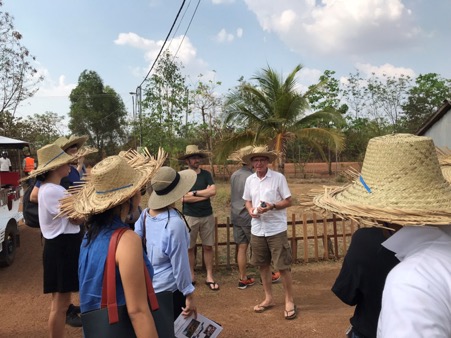
The first project brought us to the Smiling Gecko Farmhouse, founded by Swiss photographer, artist and philanthropist, Hannes Schmid. An inspirational and extraordinary character himself, Hannes infected everyone with his passion and ambition. The Farmhouse cluster project, as he referred to it, had multiple components that catered to the community’s needs. First started out from the need to provide a viable home and livelihood programme for the people living in the Phnom Penh slums, the farmhouse consists of houses on the estate, agriculture and farming projects covering chicken and pig breeding, fish hatchery, carpentry school, hospitality services, and an industrial catering business.
Lesson 2: Leveraging on enterprise solutions has a multiplier effect
The people impacted extend beyond those living on the farm to the wider communities that contract from them, and are also taught entrepreneurship skills in order to set up their own businesses as part of a wider market. Whilst the above clusters are all expected to be financially self-sustainable, there is one project that will continue to require funding as it grows. The school that was recently opened and will need ongoing grants and donations not only to maintain high quality international education to the local students, but also to take care of the meals, showering and uniforms of the kids.
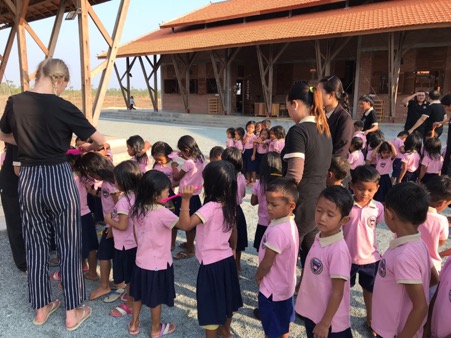
Lesson 3: Use philanthropy as a testbed for improvement and innovation
APC members and guests marvelled at the interconnecting layers of the different components and the investment needed into each and every one of it. Not only was it about financial investment, but each cluster project required expertise knowledge in order to succeed. For example, with the farming projects, Hannes shared that in the beginning, all his crops failed. It was only when he sought the help of agriculture engineers from Switzerland that he found out why. They explained to him that after years of deforestation and contamination, the soil had become infertile and in fact would require years of treatment in order to yield any vegetables. The only other crops that were possible then were coconuts and mango trees and nothing much beyond.
Lesson 4: Complex social problems require holistic solutions
Smiling Gecko and Hannes inspired the group in many different ways. It was aspirational and participants got to see in practice that just treating one symptom would not be enough in helping a person/family out of poverty and challenges. Hannes hammered in the importance of attending to their different needs and struggles – and we could all see how everything was interlinked.
Lesson 5: Listen to your beneficiaries on what they want
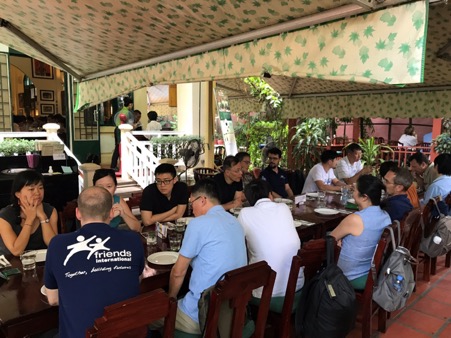
We were later able to compare what we saw at Smiling Gecko to another organisation that focused on street children and building futures for them through training and job placements. Similarly, Friends International worked extensively with the children’s families to address their needs, bringing in all the wider communities and stakeholders who have a part to play in ensuring their well-being. By contrast, their facilities were much more basic, but through the decades, they have impacted some 130,000 children.
Their founder, Sebastien Marot, introduced the group to the concept of social franchising. It is through such a strategy that they were able to replicate their model in countries like Indonesia, Myanmar, Laos, Thailand and beyond. He also shared openly about his mistakes and assumptions when he first started out and the lessons he learnt over the 25 years.
The tour around their vocational training facilities was an eye-opener – from a top-class restaurant, to childcare facilities next to beauty services and mechanics – this was a hub for everyone. And it looks set to be even more so as it opens up an enterprise incubator hub and more tourist activities at the same spot.
Lesson 6: Things will get messy and unpredictable!
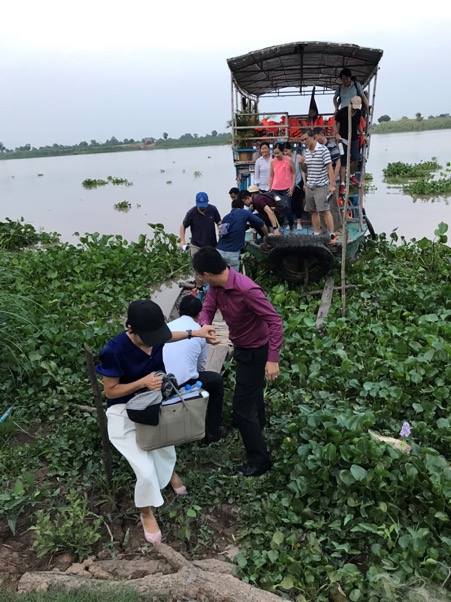
On the trip, we also visited a Lien Aid community water enterprise project, which required us to travel hours by boat to the destination. This is where we got to experience our first adventure. Despite the best of planning, traffic was bad, our boat broke down, and we had to veer off route to jump off the boat to get back on land. This was truly another example of how complicated and unpredictable development work can get. One has to stay adaptable and open in order to move things forward.
By the time we visited the water credit client with water.org, it was pitch dark at night but we still got to view the toilet that she was able to build with the loan. Interestingly, the client had a ramshackle home with huge holes in the walls but her toilet was far sturdier and built with concrete and had piped water.
Lesson 7: Attribution is tricky and unreliable
The discrepancy between the house and toilet was brought up when we visited the local microfinance institute, AMK, which was the lender. The CEO explained their business philosophy in ensuring sustainable growth, both for the company and for their clients, through responsible lending. The question was raised if their clients enjoyed an improvement in their lives compared to others. He emphasised that they shy from taking direct credit on such impact as peoples’ lives are affected by multiple factors, including natural disasters, unexpected health problems, economic crises and other environmental factors.
Lesson 8: Your beneficiaries are capable of much more than you expect
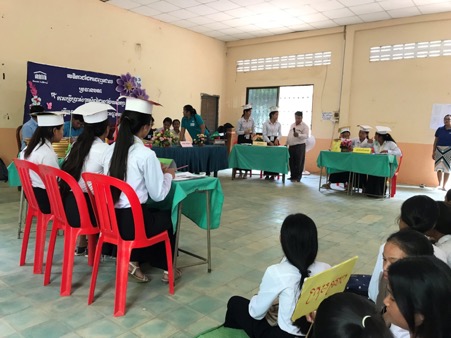
The last day for those who stayed on was a visit to a local high school that Room to Read partners with for their Girls Education Programme. Members participated in the activities, including life skills training that covered HIV, domestic violence and sex education. The students then had a school debate, and even though we did not understand the language, the confidence they displayed and their mastery of the topic absolutely impressed APC members.
Lesson 9: Collaborate to create more impact!
Our Cambodian guest, Vattanac, hosted the group and local guests for a dinner at Rosewood Hotel, which allowed further dialogue and exchange. During our interactions over the past few days, we observed another local guest thanking Hannes for his work in the country, and Vattanac commenting that the experience with APC had taught him a lot about his own country.
This goes to show that at APC, when we bring people with the resources to improve lives together, plus others who are creating great impact; we can create magic. We are eagerly looking forward to the future impact that this group will be creating.
